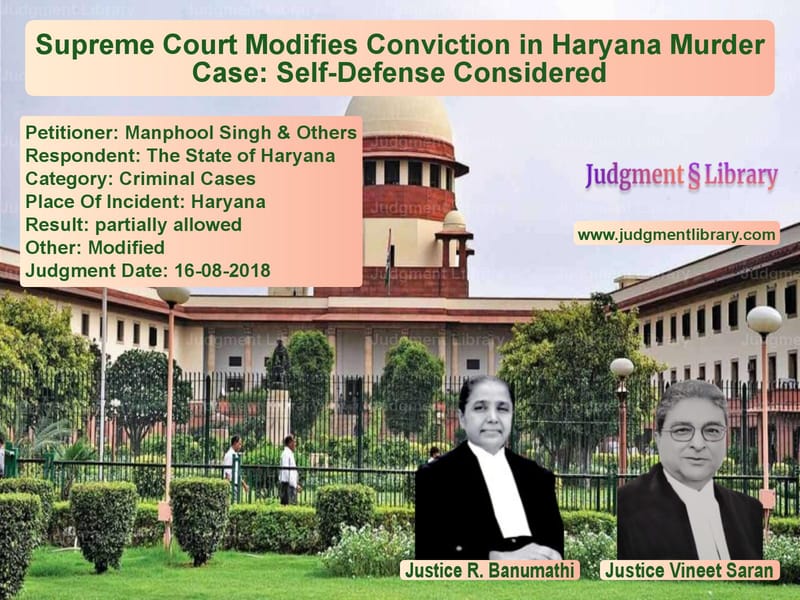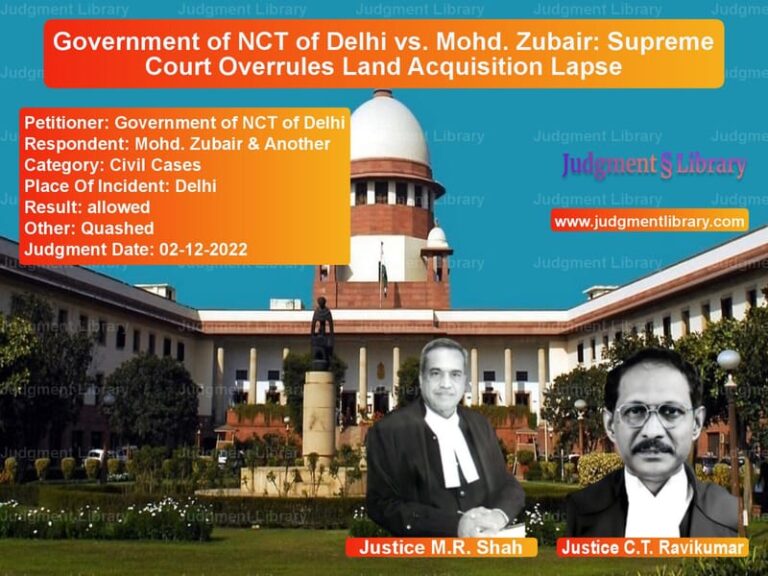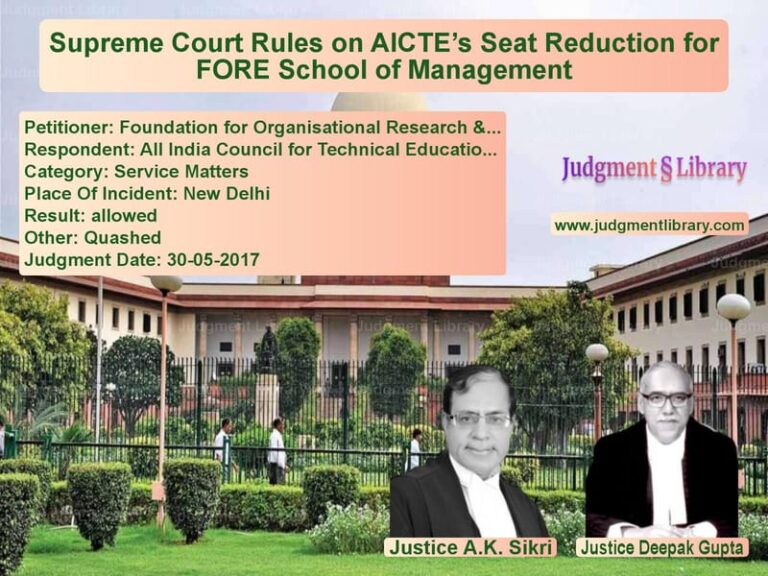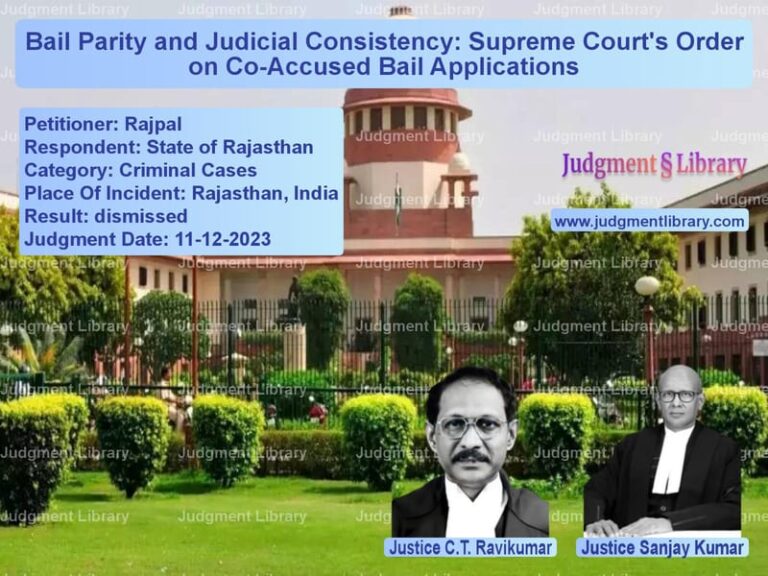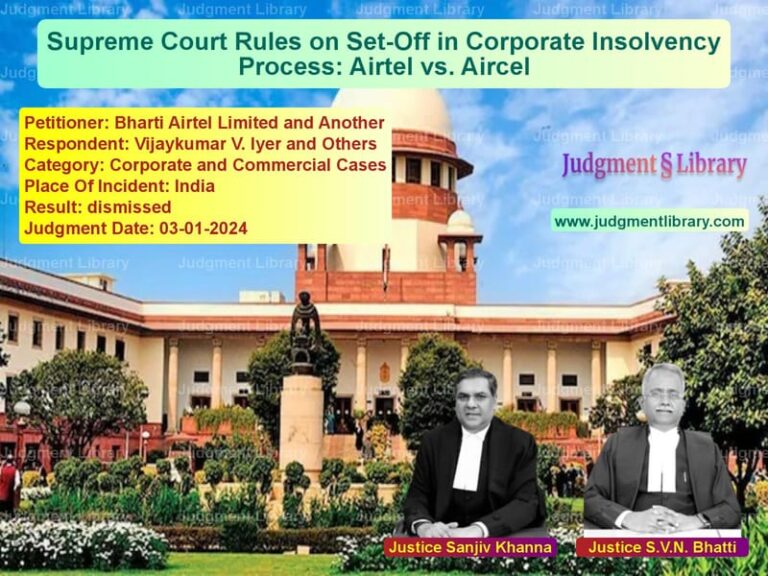Supreme Court Modifies Conviction in Haryana Murder Case: Self-Defense Considered
The Supreme Court of India, in the case of Manphool Singh & Ors. v. The State of Haryana, modified the conviction of the appellants from Section 302 IPC (murder) to Section 304 Part II IPC (culpable homicide not amounting to murder). The ruling, delivered on August 16, 2018, by a bench comprising Justice R. Banumathi and Justice Vineet Saran, acknowledged the role of self-defense in the incident while noting that the accused exceeded the right to private defense.
Background of the Case
The case arose from a violent altercation on March 14, 1994, between two groups in Haryana, leading to the deaths of Gopi Chand and Mahabir. The prosecution alleged that the accused, including Surender Singh, Zile Singh, Rattan Singh, and Manphool Singh, formed an unlawful assembly and attacked the victims with lathis and firearms. The trial court convicted all accused under Sections 302 r/w 149 and 307 r/w 149 IPC, sentencing them to life imprisonment.
On appeal, the Punjab and Haryana High Court upheld the convictions of some accused but acquitted Pawan Kumar, Vijay Singh, and Narender. Aggrieved, the surviving accused moved the Supreme Court, seeking a review of their conviction.
Petitioners’ (Accused) Arguments
The defense contended:
- The accused acted in self-defense when they were attacked by the complainant party.
- The incident took place at night, making witness identification unreliable.
- The injuries sustained by the accused were not explained by the prosecution, raising doubts about the sequence of events.
- Medical reports showed that Manphool Singh (A-1) suffered ten injuries, including head injuries, proving he was also attacked.
- The courts failed to consider that the fight was a free-for-all battle between both parties.
Respondent’s (Prosecution’s) Arguments
The State of Haryana argued:
- The accused had pre-planned the attack, forming an unlawful assembly.
- Eye-witnesses, including Harpal (PW-9), Manphool (PW-10), and Mahendra (PW-11), clearly identified the accused and their overt acts.
- The accused inflicted fatal injuries on Gopi Chand (D-1) and Mahabir (D-2), proving the intention to kill.
- The injuries on the accused did not justify excessive force used against the deceased.
Supreme Court’s Observations
The Supreme Court reviewed the case and made the following key observations:
- The accused did suffer injuries, and the prosecution failed to explain these injuries, suggesting a two-sided altercation.
- The self-defense plea was partially valid but the accused exceeded the right to private defense.
- Medical inconsistencies in the number of injuries sustained by the deceased raised reasonable doubts.
- The absence of direct evidence showing premeditated attack led the Court to modify the conviction from murder (302 IPC) to culpable homicide (304 Part II IPC).
Final Judgment
The Supreme Court ruled:
- The conviction of the appellants under Section 302 IPC was modified to Section 304 Part II IPC.
- The sentence was reduced to the period already undergone (8-9 years of imprisonment).
- The appeal against the acquittal of Pawan Kumar, Vijay Singh, and Narender was dismissed.
- Surender Singh, the only surviving appellant, was released as he had already served his modified sentence.
Impact of the Judgment
This judgment reaffirmed the legal principles of self-defense and excessive force:
- Recognition of Self-Defense: Courts must consider injuries sustained by accused persons when evaluating the right to private defense.
- Limits to Private Defense: If an accused exceeds necessary self-defense, liability may shift from murder to culpable homicide.
- Judicial Review of Medical Evidence: Discrepancies in injury reports can influence conviction severity.
Conclusion
The Supreme Court’s ruling in Manphool Singh & Ors. v. The State of Haryana underscores the balance between self-defense and excessive retaliation. While acknowledging the accused’s injuries and self-defense plea, the Court found that they exceeded reasonable force. This case sets an important precedent for evaluating private defense in violent altercations.
Petitioner Name: Manphool Singh & Others.Respondent Name: The State of Haryana.Judgment By: Justice R. Banumathi, Justice Vineet Saran.Place Of Incident: Haryana.Judgment Date: 16-08-2018.
Don’t miss out on the full details! Download the complete judgment in PDF format below and gain valuable insights instantly!
Download Judgment: Manphool Singh & Oth vs The State of Haryana Supreme Court of India Judgment Dated 16-08-2018.pdf
Direct Downlaod Judgment: Direct downlaod this Judgment
See all petitions in Murder Cases
See all petitions in Attempt to Murder Cases
See all petitions in Bail and Anticipatory Bail
See all petitions in Judgment by R. Banumathi
See all petitions in Judgment by Vineet Saran
See all petitions in partially allowed
See all petitions in Modified
See all petitions in supreme court of India judgments August 2018
See all petitions in 2018 judgments
See all posts in Criminal Cases Category
See all allowed petitions in Criminal Cases Category
See all Dismissed petitions in Criminal Cases Category
See all partially allowed petitions in Criminal Cases Category

